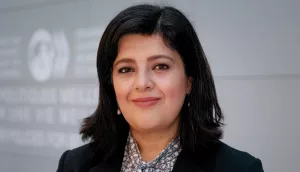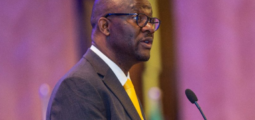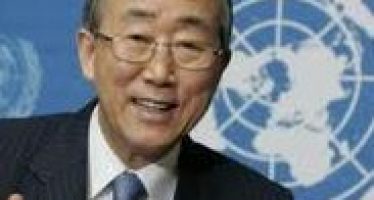OECD: Sustainable Development and Climate Change Require More than Just Money
Blended finance could hold the key to overcoming major world challenges.
Financing the UN’s Sustainable Development Goals and climate objectives requires huge financial investment — in an increasingly urgent timeframe.

By María del Pilar Garrido Gonzalo Director for Development Co-operation, OECD
Seven years remain to meet the 2030 Agenda. The pressure to act has resulted in calls from the international community to reform global financing for sustainable development architecture and multilateral development banks (MDBs).
Those changed would include the Bridgetown Agenda launched by Mia Mottley, Prime Minister of Barbados, as well as the G20 review of MDB capital adequacy frameworks and G7+ proposal to reform the World Bank Group.
US Treasury Secretary Janet Yellen has emphasised the need to mobilise finance more effectively. Governments alone will not be able to bear the burden, and private finance has a crucial role to play.
Efforts to unlock private investments for sustainable development in developing counties — with the support of blended finance — are not on-pace to meet global ambitions. This is despite the “push-effect” of institutional inclusion in ESG-related and SDG-aligned investments.
Blended finance can provide financial returns to investors, and expand resources for developing countries. It complements domestic investment in those countries, and official development assistance (ODA) inflows. It can help to close the SDG- and climate-financing gaps — and there is scope to achieve more.
Official development assistance (ODA) from the OECD Development Assistance Committee (DAC) members amounted to some $186bn in 2021. Between 2012 and 2020, $300bn in private financing was mobilised by official development finance interventions, peaking at just over $51bn in the final year.
“Efforts to unlock private investments for sustainable development in developing counties — with the support of blended finance — are not on-pace to meet global ambitions.”
The recent annual conference of the OECD DAC Community of Practice on Private Finance for Sustainable Development (CoP-PF4SD) brought together around 800 policymakers and experts to discuss how to achieve scale and impact when mobilising private finance for the SDGs.
Blended finance can boost limited public funds by investing in proven financial instruments such as credit and political risk-guarantees or first-loss exposures. This changes the risk-return relationship of public sector projects and transactions in developing countries to match the private sector’s appetite — and lies at the heart of the blended finance concept.
Development finance instruments applied at market rates can improve viability and boost investor confidence, while concessional development finance reduces the weighted average cost of capital. It works towards delivering financial sustainability.
The conference distilled three key points:
Unlocking Private Finance Requires More Than Money
One of the key bottlenecks is a dearth of bankable projects in developing countries. “Bankable” means ready-for-financial-close projects with predictable and secure long-term cash-flows. Investment into pipeline development is needed — as is capacity development and a thorough financial and operational risks-and-gaps analysis.
An understanding of good practice in terms of instruments, projects and programmes — including peer learning — is important for public sector actors aiming to unlock private finance. It is equally important to facilitate the correct institutional set-up to enable mobilisation at scale, and bring donors together for collaborative approaches to mobilisation and impact.
A unified approach is crucial to scaling finance. In the multi-stakeholder concept, blended finance actors can include development ministries or ministries of foreign affairs and the aid agencies that typically administer the ODA budget. Ministries of finance or treasuries typically hold decision-making power on financial guarantees and shareholder positions on the boards of MDBs. Stronger ties between public and private sector actors improve mutual understanding of each other’s needs, investment preferences, and value added.
The OECD DAC Blended Finance Principles put effective partnering centre stage, and realities require follow-up.
Innovation and Replication May Not Lead to Scale
Tailoring blended finance to local contexts and conditions is one of the OECD principles. Tailor-made transactions ensure that players can come together with their various comparative advantages. “New” and “first time” deal structures must be followed by implementation of proven structures at scale to capitalise on the efforts. While development actors and policymakers tend to focus on innovative approaches, mainstream private sector financial actors value track records and comprehensive data.
The CoP-PF4SD conference found that smaller, repetitive, and similarly structured projects can be conducive to scale. But excessive replication can foster fragmentation. If 10 development actors were to set up a blended finance facility of $10m each, this would create 10 times the transaction cost as nine development actors backing one established facility of $100m.
From a private sector view, a vast offer of smaller scale blending opportunities can be hard to digest and involves high transaction costs. The 2020 edition of the OECD Blended Finance Funds and Facilities Survey captures 198 existing vehicles. The IFC Amundi Planet Emerging Green One (EGO) fund, invests in green bond issuances in developing countries. As a collective investment vehicle, it pools official and commercial finance as “anchor investments”, and pension funds, insurance companies and asset managers as senior investors.
The fund closed at $1.42bn in 2018, with the aim of deploying $2bn over the seven years of operation. Unlocking commercial capital will require a certain degree of transparency.
Use Established Instruments and Practices
Recent market developments put a strong emphasis on “portfolio approaches” to mobilise commercial financiers and overcome ticket-size and diversification challenges. These include credit-risk sharing mechanisms such as securitisation as well as green, social, sustainability and sustainability-linked (GSSS) bonds.
With regards to the former, development actors can leverage the vast outreach of local commercial lenders by absorbing part of their credit risks via syndications or guarantees. This can enable them to do more (for example, loans to micro-SMEs or young entrepreneurs). In the burgeoning GSSS bond market, development actors can fuel the uptake in ODA-eligible countries through targeted actions in policy areas such as market infrastructure, support of issuers, anchor investments, impact reporting or guarantees.
Development finance is not being reinvented by the use of guarantees or technical assistance. Securitisation and GSSS bonds can be seminal in mobilising and motivating investors.
The international community needs to act if global challenges are to be overcome; reform proposals are required to get there and the Spring IMF/WB Meetings and upcoming Macron summit in June are events that could and should propel action. The increased use of blended finance instruments has a contribution to make.
About the Author
María del Pilar Garrido Gonzalo is the OECD Director for Development Co-operation.
Before joining the Organisation, between May 2018 and May 2022, Garrido was the Minister of Planning and Economic Policy in Costa Rica, responsible for the areas of climate-resilient development, sustainable public investment, public sector reform, and development co-operation policy. Also, in office, she has served as the Deputy Minister of Planning an Economic Policy, the Technical Secretariat of the 2030 Agenda, Chief of Staff and Senior Advisor.
Prior to this, she worked for 13 years at the country level on locally led sustainable development cooperation projects in Costa Rica, Central America and the Caribbean, and the Latin American region for UNDP, the European Union and the Diputació de Barcelona.
She has also worked for NGOs on multi-stakeholder partnerships for sustainable development, particularly engaging with the private sector and civil society organisations.
Garrido is both a Spanish and a Costa Rican national, holds a BA in Political Science from the University of Costa Rica, a MSc in Economics from Trinity College and a MA in Political Science with an emphasis on democratic governance and public policy from University of Costa Rica.
You may have an interest in also reading…
THE UN and Water Management
The United Nations has launched the International Year of Water Cooperation, which seeks to provide a platform for countries to
Summit Commitments of the G8 Leaders
Extracted from Remarks made by David Cameron on Thursday 18th June. Our economies together make up around half of the
Flight Links: UK risks Billions in Trade with Fast Growing Economies
According to the Confederation of British Industry, the United Kingdom is likely to miss out on billions of pounds in


















































































